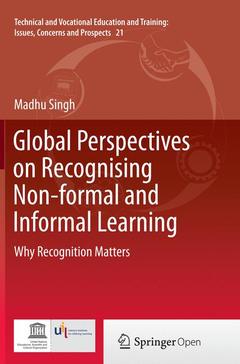Global Perspectives on Recognising Non-formal and Informal Learning, Softcover reprint of the original 1st ed. 2015 Why Recognition Matters Technical and Vocational Education and Training: Issues, Concerns and Prospects Series, Vol. 21
Auteur : Singh Madhu

Foreword.- Acknowledgements.- Acronyms.- Chapter 1. Introduction.- Chapter 2. Key concepts, definitions and assumptions.- Chapter 3. Policy and legislative environment.- Chapter 4. RVA’s role in education, working life and society.- Chapter 5. Coordination and stakeholder interests and motives.- Chapter 6. Features of best practice from country examples. Chapter 7. Sharing learning: cross-country observations.
Explains why recognition is important and of value to individuals and groups across countries through a variety of approaches
Emphasises the multiplicity of forms of recognition, addressing a broad range of purposes
Examines how countries engage with facilitating the integration and empowerment of marginalised social groups and individuals and strengthening their motivation for lifelong learning and participation in the knowledge society
Highlights the shared elements of recognition across countries, cultures and contexts in order to promote the continuous exchange of country experiences
Includes supplementary material: sn.pub/extras
Date de parution : 10-2016
Ouvrage de 220 p.
15.5x23.5 cm
Date de parution : 06-2015
Ouvrage de 220 p.
15.5x23.5 cm
Thèmes de Global Perspectives on Recognising Non-formal and... :
Mots-clés :
Accreditation of informal learning; Accreditation of non-formal learning; Adult education; Continuing education; Lifelong learning; National qualifications frameworks; Non-formal and informal learning; Recognition of informal learning; Recognition of non-formal learning; Recognition; validation and accreditation; Skills development; Technical education; Validation of informal learning; Validation of non-formal learning; Vocational education; Work-based learning; Work-related learning



